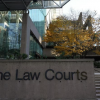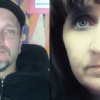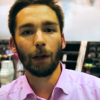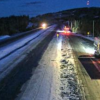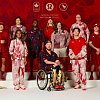(UPDATE: June 29 @ 9:12 am): Canada has signed an agreement to upgrade the NATO battlegroup it leads in Latvia to a brigade, a move that signals a commitment to the military alliance even as the federal Liberals resist calls to boost defence spending to two per cent of GDP.
Prime Minister Justin Trudeau oversaw a small ceremony as Defence Minister Anita Anand and her Latvian counterpart signed the agreement on the sidelines of a major NATO summit in Spain where Russia’s war in Ukraine has been front and centre.
Trudeau said the agreement lays out the next steps for the Canadian-led battlegroup in Latvia, "given Russia's more aggressive posture."
“This is a commitment that the Canadian government is making together with Latvia to work with our allies to move towards and surge to a brigade-level battalion and brigade-level force in Latvia,” Anand told reporters afterward.
However, the government says it's too early to confirm whether that will entail deploying additional Canadian troops.
The Canadian-led NATO battlegroup in Latvia comprises about 2,000 troops, including 700 Canadians, and is one of eight such combat units based in eastern Europe designed to deter and defend against any Russian invasion.
NATO Secretary-General Jens Stoltenberg confirmed Monday the eight battlegroups will be increased to brigade-level forces, which will mean doubling the number of troops to between 3,000 and 5,000.

Germany and Britain both said in recent weeks that they are ready to lead larger combat units in Lithuania and Estonia, respectively, and there had been questions about whether Canada would follow suit.
Yet even as Anand and Latvian Defence Minister Artis Pabriks were lauding the agreement, they also described it as a first step in what will be a longer process to determine exactly which countries will be contributing new troops and gear.
The new brigade will require not only more soldiers, Anand said, but also additional equipment and capabilities such as anti-tank weaponry and air defences, as well as upgraded command and control units and ammunition.
Anand left the door open to Canada providing some of those additional forces, but said the finer details of building the new unit will be contingent on discussions with different NATO members about their ability to assist.
That includes even the final size of the force, which neither Anand nor Pabriks could accurately describe.
The stock-taking exercise has already started, said Anand, who noted the Canadian-led battlegroup includes troops from 10 other alliance countries, making it the most diverse such unit in the region.
“We need to make sure that we are hearing from all of the member countries, and understanding what their respective capabilities are, including our own, and then make decisions about how we will increase the numbers of troops,” she said.
“But as I said, it is very early days.”
Simply boosting the force to a brigade level is relatively easy, “but for a real defence system, which we are looking for because of the Russian threat, we look much deeper and wider,” Latvia's chief of defence Lt.-Gen Leonid Kalnins told reporters at the summit site Wednesday.
Latvia will be looking for specific capabilities, including long-range missile defence, and air and naval missile defence capabilities, he said.
The Latvia battlegroup already includes an artillery unit of about 100 Canadian troops recently added in response to Russia’s invasion of Ukraine. Canada has also promised several senior officers to the country.
The battlegroup is in addition to several naval warships currently deployed with two NATO task forces around Europe along with transport and surveillance aircraft.
NATO has steadily stepped up its presence since the first inklings of a potential invasion in January, effectively flexing its muscle to deter Russia from picking a fight with an allied nation.
If Russia were to cross into NATO territory it would trigger an all-out international war between dozens of countries, as an attack on one allied nation is considered an attack on all 30.
The new agreement was announced hours after Canada found itself in the spotlight as Stoltenberg said he expects Canada to fulfil its commitment to increase defence spending to meet the needs of an increasingly dangerous world.
Robert Baines, president of the NATO Association of Canada, said the announcement of an upgraded force in Latvia indicates Canada's dedication to the alliance.
"This is a strong message of continued support for NATO which will allow Canada to draw attention to the capabilities and contributions that the Canadian Armed Forces bring to NATO operations and which will help balance out the lacklustre metric of our low defence spending," he said in a statement.
Among the numerous decisions Stoltenberg said had been taken by leaders was a recommitment for all members to spend at least two per cent of the national gross domestic product on defence, a target first agreed to in 2014.
“Two per cent is increasingly seen as the floor, not as the ceiling,” he said.
Yet while the vast majority of allies already meet the threshold or have laid out specific plans to reach it by 2024, Stoltenberg said a handful have made "concrete commitments" without a specific timetable.
Canada is almost certainly in the last group, as the Liberal government has refused to publicly commit to the two per cent target, let alone lay out a schedule for meeting it.
In fact, a report released by Stoltenberg on Monday projected Canadian defence spending will actually fall as a share of GDP to 1.27 per cent this year. That compares to 1.32 per cent last year and 1.42 per cent in 2020.
The parliamentary budget office has estimated it would cost $75 billion over five years to reach the NATO target.
Asked about Canadian defence spending, Stoltenberg told reporters he understands the desire to spend taxpayer dollars on health care, education and infrastructure. But he said members need to invest in defence as the world grows more dangerous.
“I expect all allies to meet the guidelines that we have set,” he said. “So of course, this is a message to all allies, including Canada.”
Stoltenberg nevertheless praised Canada for leading the battlegroup in Latvia.
Foreign Affairs Minister Mélanie Joly said, when pressed by reporters on defence spending, that Canadians can be proud of the country's work within NATO and in the Ukrainian conflict in general.
Joly emphasized the role of diplomacy in responding to Russia's aggression. She announced Canada will open embassies and appoint ambassadors in Estonia, Lithuania, Slovakia and Armenia, and reinforce its diplomatic presence in Latvia.
"We believe that diplomacy remains one of the most effective ways to support security and stability and also to respond to challenges in a world experiencing a profound geopolitical shift," Joly said.
Stoltenberg, meanwhile, said leaders approved a new strategic concept that will guide the defence of the alliance for the next decade, which identifies Russia as a serious threat to NATO.
The paper adds members "cannot discount the possibility of an attack against allies’ sovereignty and territorial integrity."
NATO leaders also extended a formal invitation for Finland and Sweden to join the alliance, and promised a new package of assistance for Ukraine, including secure communications, body armour and anti-drone weapons.
(Original story: June 29 @ 5:40 am): Canada found itself under the spotlight on Wednesday as the head of the NATO military alliance said he expects Canada to fulfil its commitment to other members and increase its defence spending to meet the needs of an increasingly dangerous world.
NATO Secretary-General Jens Stoltenberg made the comments at a news conference on the sidelines of a NATO summit in Spain after the first of several meetings with Prime Minister Justin Trudeau and other leaders of the 30-member transatlantic alliance.
NATO leaders, including Prime Minister Justin Trudeau, have gathered in Madrid for the landmark summit to discuss how they will respond to Russia’s ongoing invasion of Ukraine.
Among the numerous decisions that Stoltenberg said had been taken by leaders was a recommitment for all members to spend at least two per cent of the national gross domestic product on defence, a target first agreed to in 2014.
“Two per cent is increasingly seen as the floor, not as the ceiling,” he said.

Yet while the vast majority of allies already meet the threshold or have laid out specific plans to reach it by 2024, Stoltenberg said a handful have made "concrete commitments" without a specific timetable.
Canada is almost certainly in the last group as the Liberal government has refused to publicly commit to the two per cent target, let alone lay out a schedule for meeting it.
In fact, a report released by Stoltenberg on Monday projected Canadian defence spending will actually fall as a share of GDP to 1.27 per cent this year. That compares to 1.32 per cent last year and 1.42 per cent in 2020.
The parliamentary budget office has estimated it would cost $75 billion over five years to reach the NATO target.
Asked about Canadian defence spending, Stoltenberg told reporters that he understands the desire to spend taxpayer dollars on health care, education and infrastructure. But he said members need to invest in defence as the world grows more dangerous.
“I expect all allies to meet the guidelines that we have set,” he said. “So of course, this is a message to all allies, including Canada.”
Stoltenberg nevertheless praised Canada for leading a 2,000-soldier battlegroup in Latvia, one of eight that alliance leaders agreed to strengthen in eastern Europe in response to Russia’s invasion of Ukraine.
He also said leaders had formally agreed to double the size of those battlegroups by adding more troops and capabilities, while also increasing the number of soldiers on high-readiness from 40,000 to 300,000.
Foreign Affairs Minister Mélanie Joly said, when pressed by reporters on defence spending, that Canadians can be proud of the country's work within NATO and in the Ukrainian conflict in general.
Canada has played a "leadership role" in training more than 30,000 Ukrainian troops through its mission Operation Unifier and providing heavy weapons to the country, she said.
"We are leaving a very important presence, military presence, in Latvia," she added.
Joly emphasized the role of diplomacy in responding to Russia's aggression. She announced Canada will open embassies and appoint ambassadors in Estonia, Lithuania, Slovakia and Armenia, and reinforce its diplomatic presence in Latvia.
Canada must push back against Russian influence, including its soft power, disinformation campaigns and brute force, she said.
"We believe that diplomacy remains one of the most effective ways to support security and stability and also to respond to challenges in a world experiencing a profound geopolitical shift," Joly said.
The question for Canada aside from whether it will increase its defence spending is whether it will contribute additional troops to the cause, including in Latvia.
"It sure seems like the alliance is looking to make some concrete announcements about increased actual capabilities, on higher readiness for the alliance, and I'm interested to see whether or not we have any more gas left in that particular tank," said David Perry, defence and foreign policy analyst for the Canadian Global Affairs Institute.
Trudeau said that's what he'll be speaking about with other leaders.
NATO has steadily stepped up its presence since the first inklings of a potential invasion in January, effectively flexing its muscle to deter Russia from picking a fight with an allied nation.
If Russia were to cross into NATO territory it would trigger an all-out international war between dozens of countries, as an attack on one allied nation is considered an attack on all 30.
Russian President Vladimir Putin offered Ukraine's aspirations to join NATO as one of the justifications for the invasion.
Stoltenberg said leaders had approved a new strategic concept that will guide the defence of the alliance for the next decade, which identifies Russia as a serious threat to NATO.
The paper adds members "cannot discount the possibility of an attack against allies’ sovereignty and territorial integrity."
NATO leaders also extended a formal invitation for Finland and Sweden to join the alliance, and promised a new package of assistance for Ukraine, including secure communications, body armour, anti-drone weapons.
Russia has launched fresh attacks on civilians in the country — most recently with a missile strike on a shopping mall in Kremenchuk in central Ukraine Monday that killed at least 18 people.










